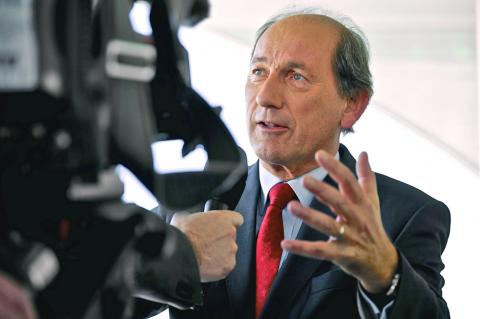Nestle SA chief executive officer Paul Bulcke said Switzerland is losing business appeal because of the country’s referendum to restrict immigration and the strength of its currency.
“If we would have to expand something here, I would think twice,” the Belgian CEO said on Thursday during a press conference on full-year results at the food company’s Vevey headquarters.
Swiss voters last year approved a plan to restrict immigration, while more recently the Swiss National Bank unleashed a surge in the country’s currency by abruptly abandoning an exchange-rate cap.

Photo: Bloomberg
Bulcke said Nestle might not have picked the Swiss town of Romont as the site for a new Nespresso factory if it was making the decision now.
“The Swiss franc is part of it,” Bulcke said in an interview. “But there are other dimensions in my eyes that are even more important: immigration. I have people here that run a multinational. I need people who understand these countries.”
Nestle began almost 150 years ago making infant formula on the shores of Lake Geneva. Bulcke’s comments highlight the challenge Switzerland has in continuing to attract business investment. The Swiss economy has outperformed the neighboring euro area every quarter since 2012.
“Switzerland needs to think about that,” Bulcke said.
Nestle does not intend to move businesses out of the country and is not planning job cuts, he said. However, he was not sure if Nestle will replace all employees in the nation when they leave.
More than half of the company’s research costs are in Switzerland, Bulcke said. The KitKat maker has opened research centers elsewhere in the world in past years to avoid concentrating too much in one country, he said.
Nestle has 10 plants in Switzerland, which export about two-thirds of their production. The company gets less than 2 percent of total revenue from its home country, and has about 10,000 employees in Switzerland, out of a total of 339,000.
“We’re going to work on that to see how we can soften the impact of the Swiss franc’s revaluation,” Bulcke said.

SEEKING CLARITY: Washington should not adopt measures that create uncertainties for ‘existing semiconductor investments,’ TSMC said referring to its US$165 billion in the US Taiwan Semiconductor Manufacturing Co (TSMC, 台積電) told the US that any future tariffs on Taiwanese semiconductors could reduce demand for chips and derail its pledge to increase its investment in Arizona. “New import restrictions could jeopardize current US leadership in the competitive technology industry and create uncertainties for many committed semiconductor capital projects in the US, including TSMC Arizona’s significant investment plan in Phoenix,” the chipmaker wrote in a letter to the US Department of Commerce. TSMC issued the warning in response to a solicitation for comments by the department on a possible tariff on semiconductor imports by US President Donald Trump’s

‘FAILED EXPORT CONTROLS’: Jensen Huang said that Washington should maximize the speed of AI diffusion, because not doing so would give competitors an advantage Nvidia Corp cofounder and chief executive officer Jensen Huang (黃仁勳) yesterday criticized the US government’s restrictions on exports of artificial intelligence (AI) chips to China, saying that the policy was a failure and would only spur China to accelerate AI development. The export controls gave China the spirit, motivation and government support to accelerate AI development, Huang told reporters at the Computex trade show in Taipei. The competition in China is already intense, given its strong software capabilities, extensive technology ecosystems and work efficiency, he said. “All in all, the export controls were a failure. The facts would suggest it,” he said. “The US

The government has launched a three-pronged strategy to attract local and international talent, aiming to position Taiwan as a new global hub following Nvidia Corp’s announcement that it has chosen Taipei as the site of its Taiwan headquarters. Nvidia cofounder and CEO Jensen Huang (黃仁勳) on Monday last week announced during his keynote speech at the Computex trade show in Taipei that the Nvidia Constellation, the company’s planned Taiwan headquarters, would be located in the Beitou-Shilin Technology Park (北投士林科技園區) in Taipei. Huang’s decision to establish a base in Taiwan is “primarily due to Taiwan’s talent pool and its strength in the semiconductor

French President Emmanuel Macron has expressed gratitude to Hon Hai Precision Industry Co (鴻海精密) for its plan to invest approximately 250 million euros (US$278 million) in a joint venture in France focused on the semiconductor and space industries. On his official X account on Tuesday, Macron thanked Hon Hai, also known globally as Foxconn Technology Group (富士康科技集團), for its investment projects announced at Choose France, a flagship economic summit held on Monday to attract foreign investment. In the post, Macron included a GIF displaying the national flag of the Republic of China (Taiwan), as he did for other foreign investors, including China-based